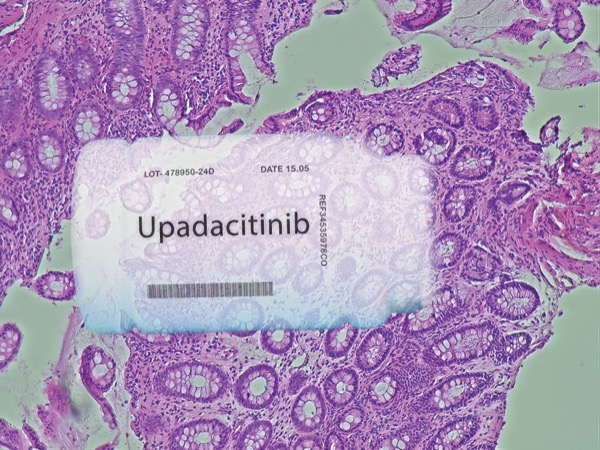SAN DIEGO—Upadacitinib is safe for adults 50 years of age and older with moderate to severe ulcerative colitis, according to retrospective study data presented at DDW 2025. Except for elevated liver enzymes, older adults with UC who took the Janus kinase inhibitor experienced a rate of adverse events similar to that seen in younger people.
“There are lingering safety concerns about JAK inhibitors in older adults, based on experience with tofacitinib [Xeljanz, Pfizer],” said investigator Kendall Beck, MD, a gastroenterologist at the University of California, San Francisco (UCSF). Those concerns include an elevated risk for major cardiovascular events, thrombosis and herpes zoster in older adults with UC who take tofacitinib (J Crohns Colitis 2024;18[3]:488-491).
However, upadacitinib (Rinvoq, AbbVie) may not have similar risks, according to Dr. Beck. He and his co-investigators compared the safety profiles of 88 people younger than 50 who received upadacitinib for UC from 2015 to 2024 with those of 35 people 50 and older with UC who received upadacitinib in the same time frame (poster Mo1846). The researchers tracked safety profiles for two years after initiation of upadacitinib.
There were no significant differences in infections, cardiovascular events, blood clots or malignancies between the two groups, even though the older group was more likely to have hyperlipidemia (48.6% vs. 11.4%) and hypertension (25.7% vs. 6.8%) than the younger group. The older patients also were more likely to have elevated liver enzymes than the younger patients (11.4% vs. 2.3%; P=0.05).
“There may be selection bias at play here, as providers at our institution may be more likely to preferentially use upadacitinib in healthier older patients,” Dr. Beck noted, adding that providers may be more likely to choose more selective biologic medications for patients with more comorbidities.
An advantage of upadacitinib is that, as an oral pill, it is easier to take than an injectable medication.
In general, providers should feel confident offering upadacitinib to older people with UC, Dr. Beck suggested, unless something specific to the patient’s clinical profile suggests otherwise.
In another study conducted on the same cohort of patients, the researchers found that upadacitinib was more effective in patients 50 and older than in the younger group (poster Mo1847). After 24 months of therapy, 75% of older and 34.3% of younger patients achieved endoscopic remission (P=0.005), and 54.6% of older and 16.7% of younger patients reached histologic remission (P=0.009).
While both groups had similar severity of disease at baseline, the younger patients had a higher flare rate during maintenance therapy (32.2% vs. 8.8%; P=0.008). Both groups experienced similar rates of hospitalization and inflammatory bowel disease–related surgery.
“We need to continue to investigate the safety and efficacy of new UC treatments in the older adult population as [these] therapies come to market,” Dr. Beck said.
Reassuring Data
“This study provides additional reassurance to providers that upadacitinib, a JAK inhibitor, appears to be safe in older adults,” said Anita Afzali, MD, MPH, MHCM, a gastroenterologist and the executive vice chair of the Department of Internal Medicine at the University of Cincinnati.
Dr. Afzali noted that phase 3 clinical trial data for upadacitinib showed that approximately 50% of participants had at least one risk factor for cardiovascular disease (CVD), and 17% were older than 50 with an additional CVD risk factor (Lancet 2022;399[10341]:2113-2128). The safety profile was not adversely affected by age, and the incidence of adverse events was not higher among participants older than 50. The DDW study appears consistent with those clinical trial findings, Dr. Afzali said, reinforcing the generalizability of the safety data to real-world patient populations with similar risk profiles.
Unlike tofacitinib, which is a nonselective JAK inhibitor, upadacitinib selectively targets JAK1, which may account for potential differences in safety, Dr. Afzali said, although direct comparisons are limited and long-term safety data are still needed. “We need longer-term patient exposure data across all age groups,” she emphasized. “Currently, some providers may discontinue upadacitinib after six to 12 months due to cardiovascular risk concerns or other safety concerns, including infection, thromboembolism or malignancy. Extended follow-up may help clarify whether this oral small molecule can be used more safely for longer durations.”
—Marcus A. Banks
Drs. Afzali and Beck each reported a financial relationship with AbbVie.
This article is from the July 2025 print issue.





